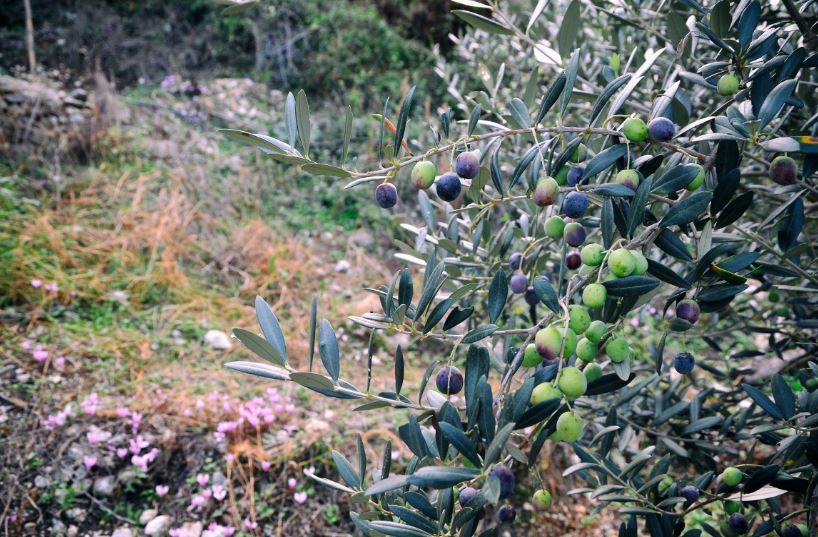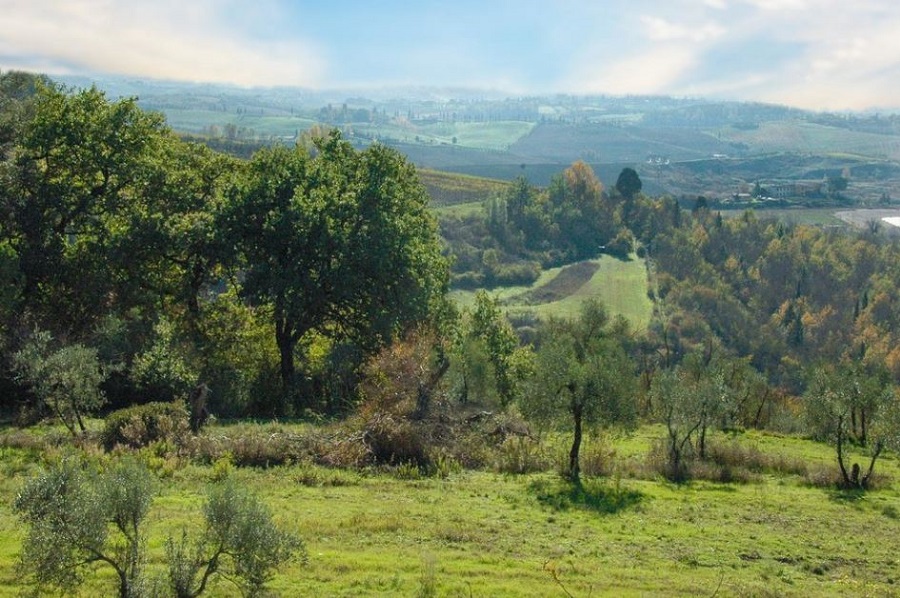
A little goes a long way
If everyone makes a small contribution to fighting biodiversity loss, we can have a great impact. Here’s how some of our employees are doing their bit to help.
Get Almir Kolari onto the subject of olives and his eyes light up. As a child growing up in Montenegro, he sold olive oil on the beaches of Ulcinj, near where around 175,000 olive trees grow. Today, more than 250 of them belong to Almir. In 2010, he bought a neglected piece of land together with his father, painstakingly cultivated it, and then planted many trees – native varieties as well as cultivated ones that ensure more reliable harvests.
A thousand year tradition: natural olive cultivation near the Montenegrin coast. Almir Kolari's oldest olive tree is almost 600 years old.
Almir works in Institutional Cash Management in our Corporate Bank. He devotes his free time to his olive trees – partly on-site with his brother and partly virtually, as Almir lives in Frankfurt, Germany. They don’t use pesticides, only spraying their trees with nettle manure and fertilising with liquid manure. They also use a drip system that helps irrigate right where it is needed and also helps save water. By placing sheep's wool under the trees, they attract beneficial insects and traps pests. They prune the branches in a way that ensures a good harvest for the tree in the long term and allows birds to build their nests.
Almir's next goal is to accommodate tourists on his olive grove. He is building a complex with small wooden cabins where guests can experience the joys of a simple life.
”Belvedere” – beautiful view, that's what Vittorio Nuti calls his little piece of paradise between Castelfiore and Empoli.
Almir is not the only olive oil farmer at Deutsche Bank. Vittorio Nuti, head of a trader team in the Investment Bank is too. He inherited a piece of land in Tuscany from a distant aunt over ten years ago and since then has turned the fallow land into a certified organic farm and uses crop rotation to make sure the organic matter in the soil remains healthy. He has numerous areas that he lets grow wild in order to preserve the land’s biodiversity. And to improve the soil he relies on green manure, i.e. plants like legumes, which keep the soil loose and increase its nitrogen content.

Rush hour at the Sascha Merk’s beehives in southern Germany.
How we consume
If they want to find long-term customers for their products, small-scale producers of organic food like Vittorio have to answer a lot of questions: Why is their olive oil more expensive than conventionally produced oil? Why doesn't it taste the same every year? Why is the oil sometimes sold out or the pasta made from a different type of grain than wheat?
Many wild herbs and plants bloom, even what some people call weeds. But this provides a habitat for many insects, bees, and butterflies.
Our purchasing decisions have an impact on biodiversity and the climate – something that Sascha Merk from our Postbank branch in Kempten can only confirm. He has been keeping honeybee colonies on several hectares of natural meadow for many years. “Buy from beekeepers and farm shops in your area to support them,” he appeals. His meadow is left to its own resources, says Sascha. And several other employees are doing the same with their gardens.
Janine Müller, who works at the bank dealing with technical processes related to construction finance, deliberately lets parts of her property grow wild: “Many wild herbs and plants bloom, and yes, even what some people call weeds. But this provides a habitat for many insects, bees, and butterflies,” she says. A neighbour once threw a bucket of weed killer over the fence because of it. She says it takes courage – as well as patience and composure – to explain that a wild garden is not out of neglect, but has a purpose, namely to increase biodiversity.
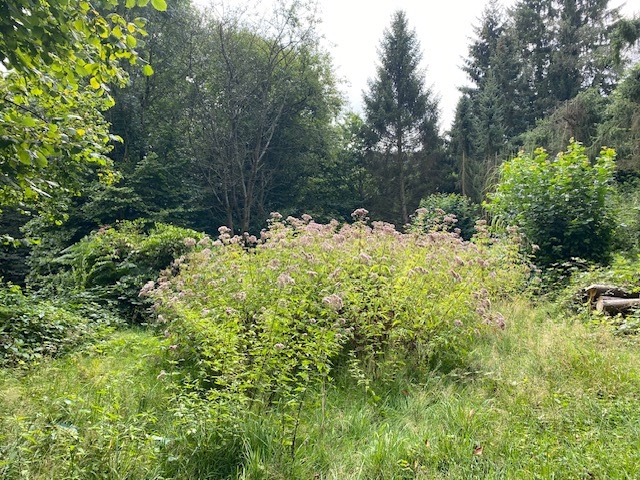
The wild part of Oliver Spielmann's garden resembles a clearing in the forest.
Someone else who lives by the principle is Oliver Spielmann, who leads sustainability projects at our Private Bank. “We felled some old fir trees on our property that had been killed by bark beetles, but instead of chipping the wood, we left them for wild bees to nest in. We're letting the back part of the garden grow wild to a certain extent. We've already discovered slow worms, fire salamanders, frogs, and May beetles among the wild herbs and tall grasses.
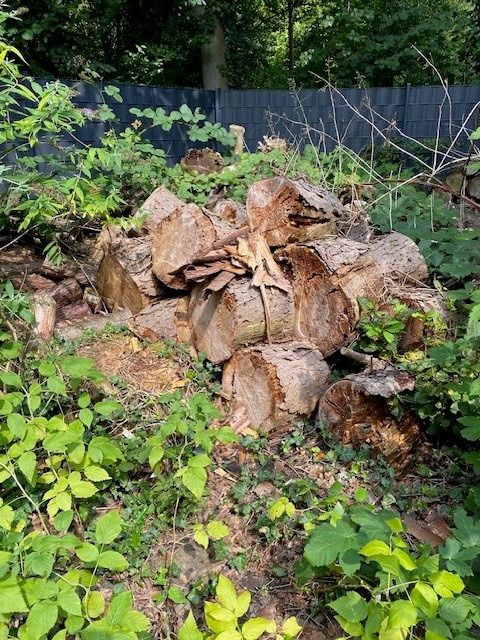
Wild bees are now nesting in the dead wood on Oliver Spielmann's property – as the holes in the logs show.
Giving up is not an option
Annett Pannier-Hoffman, an employee who works in our Financial Crime department in Schkeuditz, speaks of a misguided sense of order that opposes a nature-inspired garden. In her allotment, she relies on native plants, avoids chemicals and enjoys sharing her knowledge – which is not always gratefully received. “But giving up is not an option, every square meter counts,” she says.
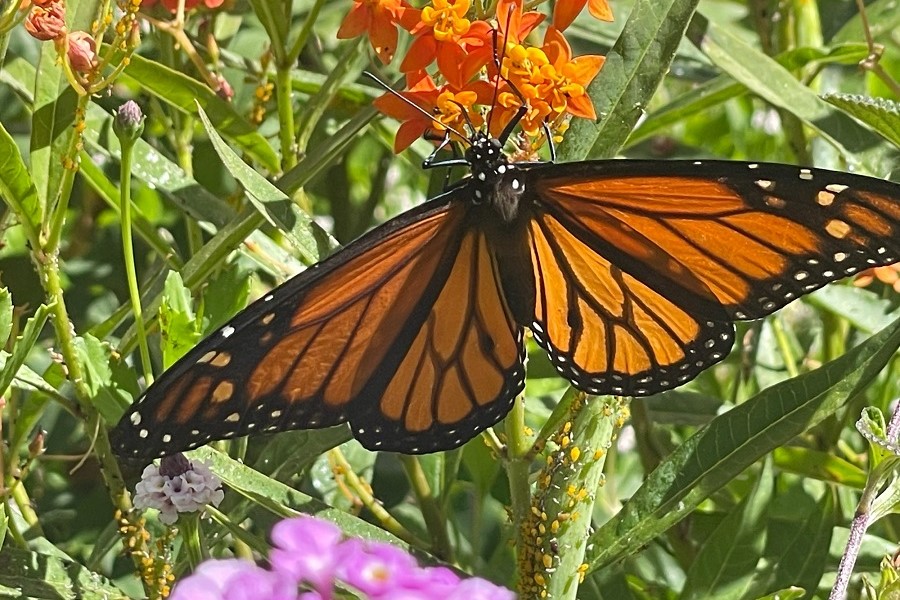
The endangered monarch butterfly feels at home in Catherine Minor's garden.
Catherine Minor, a DWS real estate expert in San Francisco, agrees: “Even just a few square metres with native plants can make a huge impact and bring insects and birds back to our cities.” Catherine even has endangered monarch butterflies visiting her garden!

Garden splendor at Catherine Minor's in California.
Every square meter counts.
Tanja Kiessling, a data protection specialist at DWS, is another of the bank’s employees who is a keen gardener. She grows vegetables on her balcony and says she always makes sure to provides insects with water.
Michael Prenzel from our Anti-Money Laundering department had his garage roof greened and can now enjoy the view and the many butterflies and bees that the plants attract. The city of Frankfurt paid for half of the green roof through a funding programme.
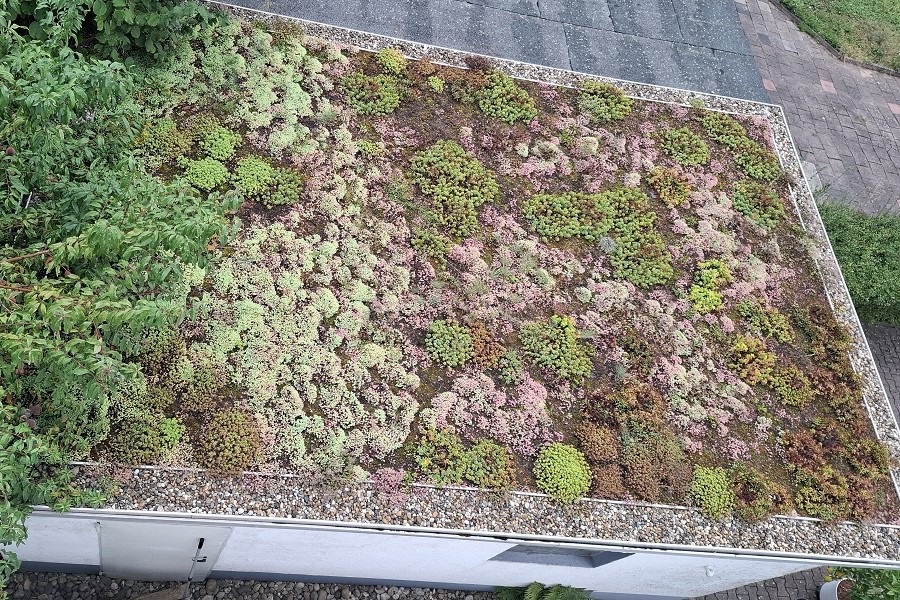
Michael Prenzel's garage roof is anything but dull.
Playing the lottery to protect hedgehogs
When it comes to protecting hedgehogs, the bigger the space, the better. Sharon Baker works in Regional Management at Deutsche Bank in Birmingham and says if she ever won the lottery, she’d use the money to create a whole hedgehog paradise. Rescuing injured or sick hedgehogs costs her a lot of time and money, especially for medication and veterinary care. Last year, Sharon cared for 186 hedgehogs at her home in the south of the city and fears there will be even more this year. It is quite common for her to receive reports of hedgehogs that have been found and are in need of care and she often stops off to collect them on her way home from the office.
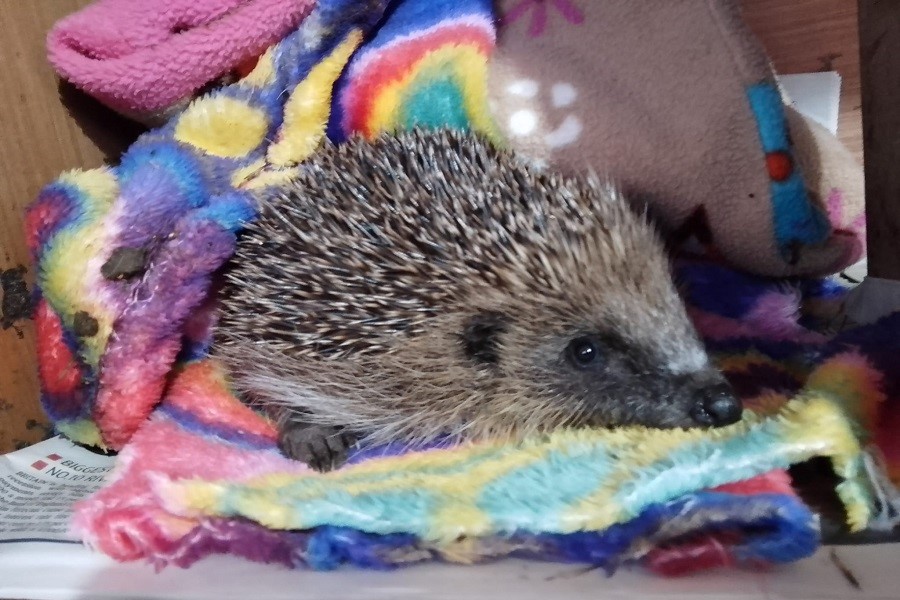
Hedgehogs have been around for millions of years, but for how much longer?
She sees the loss of habitat as the biggest danger to hedgehogs, for example through overly tidy landscapes and gardens, and strongly warns against strimmers – especially the powerful ones with blades that often injure hedgehogs severely. That's why she made sure that the city of Birmingham has its strimmers labeled with a warning notice that calls for caution when operating them. In addition to the time-consuming hedgehog care itself, Sharon does public relations work for hedgehog protection, collects donations and, with her kindness, wins over people to help her. “I am determined to stop this iconic animal going extinct,” she says.

Our colleague Sharon Baker has a heart for hedgehogs.
I am determined to stop this iconic animal going extinct.
Birds galore
Raik Herzig works in the bank’s IT department and is also dedicated to saving certain species from extinction. He breeds exotic pheasants and eared pheasants. These birds are listed in CITES, the Convention on International Trade in Endangered Species of Wild Fauna and Flora and are considered vulnerable to poaching and international trade. As a member of the World Pheasant Association, Raik also provides financial support for conservation projects in Asia: “The habitats of these animals are severely threatened there, among other things by deforestation, and there is little government-funded bird conservation,” he explains.
Some of our employees are doing their bit for biodiversity by only mowing their grass a few times a year. By letting their lawns grow wild, they provide habitat for insects and increase plant diversity. It also attracts more birds to gardens; one of our employees counted nine different types of birds, up from three previously.
Meditative mowing and visual enhancement
Hendrik Roth, a complaint manager in our Private Bank, takes things even more seriously and with about 90 percent of ground-dwelling insects being sucked up by lawnmowers, he now uses a scythe to cut his grass.
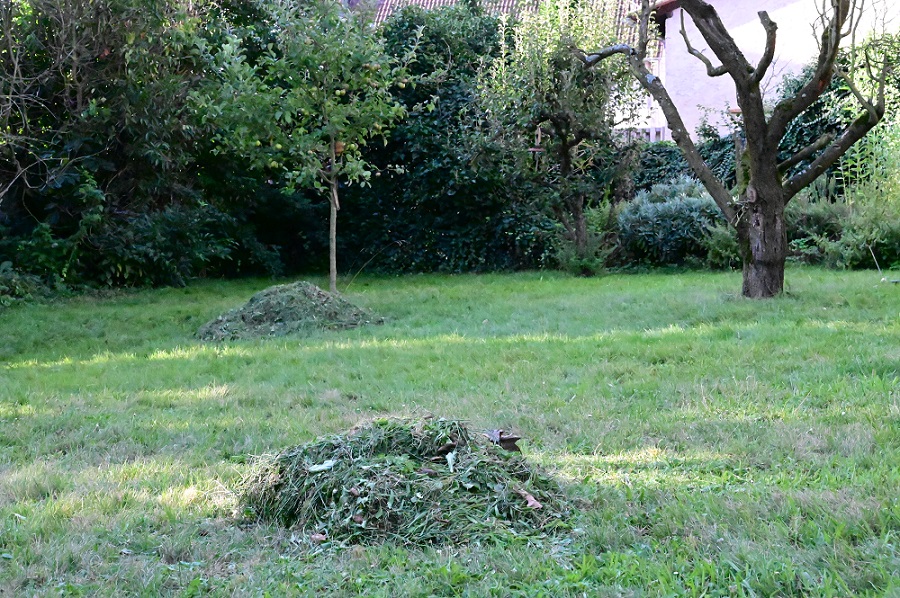
Hendrik Roth’s garden after cutting the grass with a scythe; in the background a dead tree, in which insects and birds nest.
This keeps the grass taller and makes the area much more resistant to drought and heat. And he finds using a scythe to be “a wonderful activity, almost meditative”.
When Hendrik prunes trees and bushes, he uses the cuttings to fill his deadwood hedge. “This provides habitat for insects and birds and looks a lot nicer than the chain link fence that it has replaced. I don't have to shred or dispose of the cuttings and that saves time and effort,” he says.
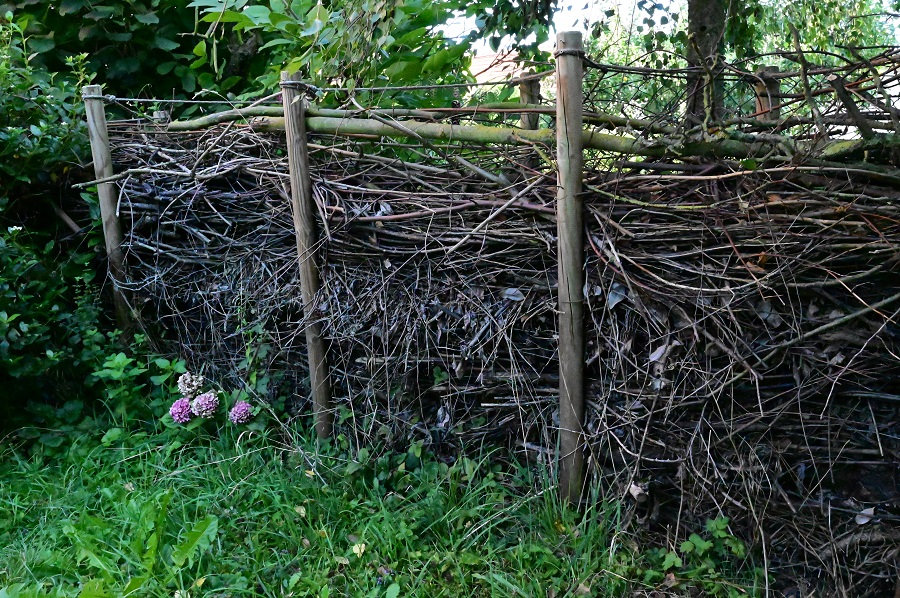
A deadwood hedge provides habitat for a variety of species.
Award-winning gardens
Some gardens are so impressive that they have won awards. Sven Franke, a construction financing specialist, received an award from the Bavarian State Office for the Environment for his bird-friendly garden.
Manfred Bornholt from our IT department has also won several competitions and received funding for his project “Kleingarten trifft Natur” (allotment garden meets nature). On a 2,300 square meter slope next to the “Sunshine” allotment garden complex in Eisenach, Germany, he has created various habitats, including insect hotels, stone piles, and a wild meadow with a wetland biotope.
Several employees from the Deutsche Bank branch in Eisenach were among those who helped get the project off the ground. Manfred's wife Andrea designed information boards for the various nature conservation elements, as the garden is also a meeting place and educational center for kindergarten and school groups.
Spiders win, moths lose
With all our artificial lights, we humans are harming crucial pollinating insects. Moths circle them until exhaustion, becoming easy prey for spiders. Christian Roßberg from our Corporate Security Office, is an amateur astronomer at the Public Observatory in Darmstadt and became a protector of the night in 2022. He co-initiated the Hessian Network Against Light Pollution together with observatories and nature conservation associations. The network raises awareness among municipalities, companies, and households about this easily avoidable environmental problem. There has already been some legislative progress at federal and state level.
I dedicate all my free time to biodiversity.

A hotel not just for ladybirds.

My garden? “A place to observe and relax".
Supporting nature conservation with legal expertise is just one of the many tasks that Edwina Dunn from our custody business takes on: “I dedicate all my free time to biodiversity,” she says.
More space for wilderness is her great concern. She supports a British project with Europe-wide impact as a volunteer lawyer. To promote the restoration of wild nature, she also founded a network of like-minded lawyers.
No wonder she also has plenty of ideas on how Deutsche Bank can do more to protect biodiversity. “Change needs strong leaders,” she says – and she is certainly one to be reckoned with.
Among the many people at Deutsche Bank who cultivate and enjoy biodiversity in their surroundings is Maren Helbig-Kreuzer. It all started when she thought it inappropriate to use well water to irrigate her “water-guzzling” garden, with its ample lawn, while groundwater levels had fallen alarmingly due to years of low rainfall in many parts of Germany.
The control function employee attended a seminar on wild plants and ordered some. “When the little plants arrived, some of them looked familiar. I used to think they were weeds and would rigorously remove them from the flower beds,” she says.
Today, Maren is passionate about edible wild and medicinal plants such as ribwort plantain and has said goodbye to those ornamental plants that needed more than just rainwater to survive. “Our garden is now a place to observe and relax, the term 'weed' has been banned, and gardening is much easier, too.”
This text was published in November 2024. Written by Verena Bamfaste.

Employees for biodiversity
When we started drafting this biodiversity dossier in the summer of 2024, we asked our employees what they were doing to encourage biodiversity – in their own backyards so to speak. We were thrilled to hear from so many of them – and are also pretty proud of some of the remarkable ways our colleagues are committed to preventing species extinction.
Recommended content
Responsible Growth | Innovation
Protecting life below water Protecting life below water
How biodiversity monitoring and environmental DNA company, NatureMetrics, uses science and deep data to help companies discover and protect species in the ocean.
Responsible Growth | Photo Story
(Roof)top solutions for taming the rain (Roof)top solutions for taming the rain
Green roofs cool the microclimate, provide habitat for wildlife and reduce the risk of flooding. The Green Bunker in Hamburg is a vivid example for Optigrün’s developments.
Responsible Growth | Story
“Biodiversity loss is the greatest crisis humanity is facing” “Biodiversity loss is the greatest crisis humanity is facing”
According to a study, two million animal and plant species are endangered – twice as many as previously assumed. Klement Tockner is working on solutions.

